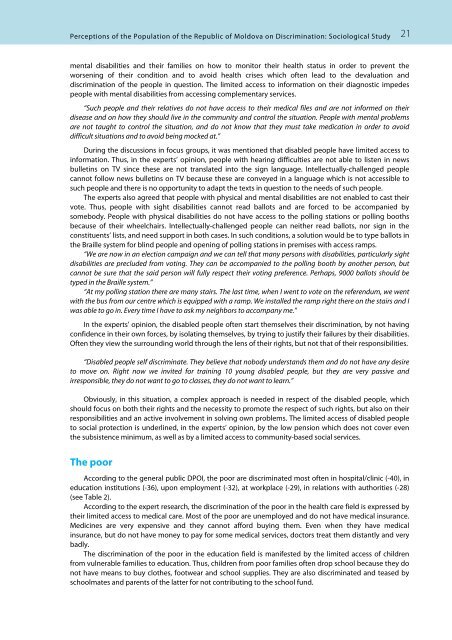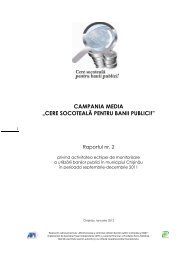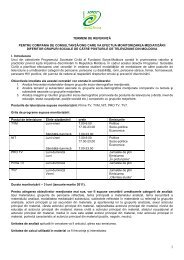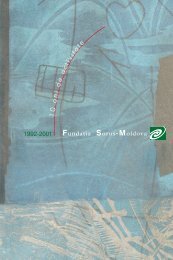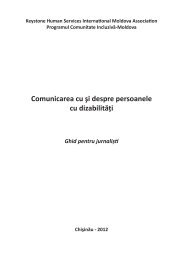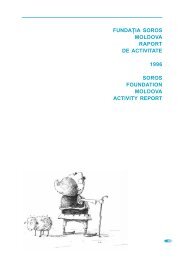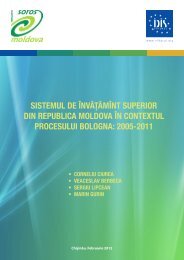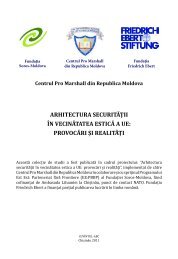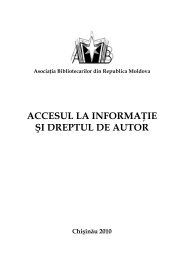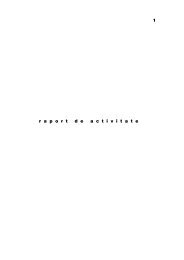<strong>Perceptions</strong> <strong>of</strong> <strong>the</strong> <strong>Population</strong> <strong>of</strong> <strong>the</strong> <strong>Republic</strong> <strong>of</strong> <strong>Moldova</strong> on Discrimination: Sociological Study 20„After graduating I applied for a position <strong>of</strong> secretary at an embassy. I passed <strong>the</strong> selection stage based onpersonal files. But during <strong>the</strong> interview, although my qualifications had been appreciated, I was not selected.Somebody on <strong>the</strong> selection panel whispered to <strong>the</strong> employer not to hire me because I will not be able to fix andbring a c<strong>of</strong>fee. The terms <strong>of</strong> reference did not include such a requirement. And <strong>the</strong>y said this thing in my presence.I also know whom <strong>the</strong>y hired. They invent different things just not to hire you.”The experts mentioned that sometimes, even though employers are open and <strong>of</strong>fer employmentopportunities to disabled people, <strong>the</strong>y cannot be hired because <strong>of</strong> <strong>the</strong> limited access to premises. In fact,<strong>the</strong> experts mentioned <strong>the</strong> lack <strong>of</strong> access ramps as one <strong>of</strong> <strong>the</strong> major obstacles for disabled people bothupon employment and access to o<strong>the</strong>r community services.„The existing infrastructure is not adjusted and not accessible and still we continue to build buildings withno access ramps. Most shops, government buildings, public institutions do not have access ramps. Not a singletown hall in rural areas <strong>of</strong> <strong>Moldova</strong> has access ramps.Sometimes <strong>the</strong> authorities explain <strong>the</strong> lack <strong>of</strong> access ramps by <strong>the</strong> fact that <strong>the</strong>re are no disabled people.Sometimes <strong>the</strong>re are ramps but <strong>the</strong>y are built with a high angle and <strong>the</strong>refore cannot be used by people inwheelchairs.Even <strong>the</strong> Department <strong>of</strong> Psychology and Pedagogy <strong>of</strong> <strong>the</strong> “Ion Creanga” Pedagogical University, which is <strong>the</strong>department training social assistants and psychologists, has nei<strong>the</strong>r access ramps nor classrooms adjusted to<strong>the</strong> needs <strong>of</strong> <strong>the</strong> disabled people.”In <strong>the</strong> experts’ opinion <strong>the</strong> disabled people are discriminated in <strong>the</strong> education system by <strong>the</strong> limitedphysical access <strong>of</strong> such children to <strong>the</strong> education institutions’ infrastructure (most education institutions donot have access ramps, doors are narrow and preclude <strong>the</strong> access <strong>of</strong> wheelchairs), limited mobility accesswithin <strong>the</strong> premises (classroom system, lessons on different floors, doorsteps, lack <strong>of</strong> adjusted restroomsetc.), an unadjusted learning environment (lack <strong>of</strong> a national curriculum adjusted to <strong>the</strong> needs <strong>of</strong> disabledchildren and <strong>of</strong> a mechanism to evaluate <strong>the</strong>ir knowledge, lack <strong>of</strong> adjusted textbooks, untrained teachers),<strong>the</strong> lack <strong>of</strong> support services (underdeveloped legal framework on employment <strong>of</strong> support teachers,personal assistants etc.), as well as <strong>the</strong> discriminatory attitude <strong>of</strong> schoolmates and <strong>the</strong>ir parents.„In school <strong>the</strong> discrimination <strong>of</strong> disabled children starts with <strong>the</strong> fact that, according to <strong>the</strong> nationalcurriculum which is very rigid, <strong>the</strong>y are forced to have <strong>the</strong> same level <strong>of</strong> performance and to achieve <strong>the</strong> sameobjectives as o<strong>the</strong>r pupils. Nobody is taking into account <strong>the</strong>ir individual needs and skills. Obviously, in suchconditions, <strong>the</strong> disabled children cannot achieve <strong>the</strong> same level <strong>of</strong> performance as ordinary children and,consequently, <strong>the</strong>y are reproached <strong>of</strong> being stupid and unfit.The teachers also have a discriminatory attitude towards <strong>the</strong>se children. Some <strong>of</strong> <strong>the</strong>m seem to be open andwish for a change but being forced at <strong>the</strong> end <strong>of</strong> <strong>the</strong> day to report on <strong>the</strong> level <strong>of</strong> graduation, <strong>the</strong>y do not havetime to take special care <strong>of</strong> <strong>the</strong> disabled children. In this situation, it is necessary to amend <strong>the</strong> current legislationwith a view <strong>of</strong> making mandatory for <strong>the</strong>se teachers to pay more attention to children with special needs in orderto achieve <strong>the</strong>ir full school inclusion.„Most experts mentioned that, even though in <strong>the</strong> last year <strong>the</strong> concept <strong>of</strong> inclusive schooling is back in<strong>the</strong> spotlight and <strong>the</strong> Ministry <strong>of</strong> Education issued a decree regarding school inclusion <strong>of</strong> <strong>the</strong> disabledchildren, <strong>the</strong>re are no effective mechanisms to implement <strong>the</strong> said decree and no financial resourcesnecessary to support <strong>the</strong> disabled children in education institutions. In <strong>the</strong>se conditions, each educationinstitution is doing whatever it can. One solution would be <strong>the</strong> enforcement <strong>of</strong> a new Education Code,which would provide a mechanism <strong>of</strong> school inclusion for disabled people, namely: developing adjustedcurricula, hiring support teaching personnel for disabled children, developing a mechanism for assessingknowledge <strong>of</strong> such children etc.The experts also mentioned <strong>the</strong> limited access <strong>of</strong> <strong>the</strong> disabled people to health services which isunderlined by <strong>the</strong> fact that <strong>the</strong>ir needs regarding health services are much greater than <strong>the</strong>ir opportunities.The insurance policy covers only <strong>the</strong> guaranteed minimum, just like in <strong>the</strong> case <strong>of</strong> o<strong>the</strong>r categories. Often<strong>the</strong> list <strong>of</strong> compensated medicines includes only cheap and less effective medicines, and <strong>the</strong> peopleconcerned are forced to buy <strong>the</strong>mselves <strong>the</strong> medicines <strong>the</strong>y need. Sometimes <strong>the</strong>re are no compensatedmedicines in pharmacies for months and in order not to disrupt <strong>the</strong>ir cures <strong>the</strong> disabled people are forcedto buy <strong>the</strong>m from <strong>the</strong>ir pension which is very low and does not cover even <strong>the</strong> subsistence minimum.As regards people with mental disabilities, <strong>the</strong> experts on <strong>the</strong> focus groups pointed out <strong>the</strong> limitedaccess <strong>of</strong> such people and <strong>the</strong>ir relatives to <strong>the</strong>ir medical files. Medical personnel do not inform people with
<strong>Perceptions</strong> <strong>of</strong> <strong>the</strong> <strong>Population</strong> <strong>of</strong> <strong>the</strong> <strong>Republic</strong> <strong>of</strong> <strong>Moldova</strong> on Discrimination: Sociological Study 21mental disabilities and <strong>the</strong>ir families on how to monitor <strong>the</strong>ir health status in order to prevent <strong>the</strong>worsening <strong>of</strong> <strong>the</strong>ir condition and to avoid health crises which <strong>of</strong>ten lead to <strong>the</strong> devaluation anddiscrimination <strong>of</strong> <strong>the</strong> people in question. The limited access to information on <strong>the</strong>ir diagnostic impedespeople with mental disabilities from accessing complementary services.“Such people and <strong>the</strong>ir relatives do not have access to <strong>the</strong>ir medical files and are not informed on <strong>the</strong>irdisease and on how <strong>the</strong>y should live in <strong>the</strong> community and control <strong>the</strong> situation. People with mental problemsare not taught to control <strong>the</strong> situation, and do not know that <strong>the</strong>y must take medication in order to avoiddifficult situations and to avoid being mocked at.”During <strong>the</strong> discussions in focus groups, it was mentioned that disabled people have limited access toinformation. Thus, in <strong>the</strong> experts’ opinion, people with hearing difficulties are not able to listen in newsbulletins on TV since <strong>the</strong>se are not translated into <strong>the</strong> sign language. Intellectually-challenged peoplecannot follow news bulletins on TV because <strong>the</strong>se are conveyed in a language which is not accessible tosuch people and <strong>the</strong>re is no opportunity to adapt <strong>the</strong> texts in question to <strong>the</strong> needs <strong>of</strong> such people.The experts also agreed that people with physical and mental disabilities are not enabled to cast <strong>the</strong>irvote. Thus, people with sight disabilities cannot read ballots and are forced to be accompanied bysomebody. People with physical disabilities do not have access to <strong>the</strong> polling stations or polling boothsbecause <strong>of</strong> <strong>the</strong>ir wheelchairs. Intellectually-challenged people can nei<strong>the</strong>r read ballots, nor sign in <strong>the</strong>constituents’ lists, and need support in both cases. In such conditions, a solution would be to type ballots in<strong>the</strong> Braille system for blind people and opening <strong>of</strong> polling stations in premises with access ramps.“We are now in an election campaign and we can tell that many persons with disabilities, particularly sightdisabilities are precluded from voting. They can be accompanied to <strong>the</strong> polling booth by ano<strong>the</strong>r person, butcannot be sure that <strong>the</strong> said person will fully respect <strong>the</strong>ir voting preference. Perhaps, 9000 ballots should betyped in <strong>the</strong> Braille system.”“At my polling station <strong>the</strong>re are many stairs. The last time, when I went to vote on <strong>the</strong> referendum, we wentwith <strong>the</strong> bus from our centre which is equipped with a ramp. We installed <strong>the</strong> ramp right <strong>the</strong>re on <strong>the</strong> stairs and Iwas able to go in. Every time I have to ask my neighbors to accompany me.”In <strong>the</strong> experts’ opinion, <strong>the</strong> disabled people <strong>of</strong>ten start <strong>the</strong>mselves <strong>the</strong>ir discrimination, by not havingconfidence in <strong>the</strong>ir own forces, by isolating <strong>the</strong>mselves, by trying to justify <strong>the</strong>ir failures by <strong>the</strong>ir disabilities.Often <strong>the</strong>y view <strong>the</strong> surrounding world through <strong>the</strong> lens <strong>of</strong> <strong>the</strong>ir rights, but not that <strong>of</strong> <strong>the</strong>ir responsibilities.“Disabled people self discriminate. They believe that nobody understands <strong>the</strong>m and do not have any desireto move on. Right now we invited for training 10 young disabled people, but <strong>the</strong>y are very passive andirresponsible, <strong>the</strong>y do not want to go to classes, <strong>the</strong>y do not want to learn.”Obviously, in this situation, a complex approach is needed in respect <strong>of</strong> <strong>the</strong> disabled people, whichshould focus on both <strong>the</strong>ir rights and <strong>the</strong> necessity to promote <strong>the</strong> respect <strong>of</strong> such rights, but also on <strong>the</strong>irresponsibilities and an active involvement in solving own problems. The limited access <strong>of</strong> disabled peopleto social protection is underlined, in <strong>the</strong> experts’ opinion, by <strong>the</strong> low pension which does not cover even<strong>the</strong> subsistence minimum, as well as by a limited access to community-based social services.The poorAccording to <strong>the</strong> general public DPOI, <strong>the</strong> poor are discriminated most <strong>of</strong>ten in hospital/clinic (-40), ineducation institutions (-36), upon employment (-32), at workplace (-29), in relations with authorities (-28)(see Table 2).According to <strong>the</strong> expert research, <strong>the</strong> discrimination <strong>of</strong> <strong>the</strong> poor in <strong>the</strong> health care field is expressed by<strong>the</strong>ir limited access to medical care. Most <strong>of</strong> <strong>the</strong> poor are unemployed and do not have medical insurance.Medicines are very expensive and <strong>the</strong>y cannot afford buying <strong>the</strong>m. Even when <strong>the</strong>y have medicalinsurance, but do not have money to pay for some medical services, doctors treat <strong>the</strong>m distantly and verybadly.The discrimination <strong>of</strong> <strong>the</strong> poor in <strong>the</strong> education field is manifested by <strong>the</strong> limited access <strong>of</strong> childrenfrom vulnerable families to education. Thus, children from poor families <strong>of</strong>ten drop school because <strong>the</strong>y donot have means to buy clo<strong>the</strong>s, footwear and school supplies. They are also discriminated and teased byschoolmates and parents <strong>of</strong> <strong>the</strong> latter for not contributing to <strong>the</strong> school fund.


